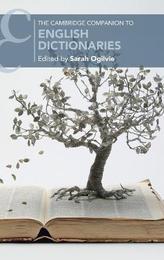
|
The Cambridge Companion to English Dictionaries
Hardback
Main Details
Description
How did a single genre of text have the power to standardise the English language across time and region, rival the Bible in notions of authority, and challenge our understanding of objectivity, prescription, and description? Since the first monolingual dictionary appeared in 1604, the genre has sparked evolution, innovation, devotion, plagiarism, and controversy. This comprehensive volume presents an overview of essential issues pertaining to dictionary style and content and a fresh narrative of the development of English dictionaries throughout the centuries. Essays on the regional and global nature of English lexicography (dictionary making) explore its power in standardising varieties of English and defining nations seeking independence from the British Empire: from Canada to the Caribbean. Leading scholars and lexicographers historically contextualise an array of dictionaries and pose urgent theoretical and methodological questions relating to their role as tools of standardisation, prestige, power, education, literacy, and national identity.
Author Biography
Sarah Ogilvie is Senior Research Fellow in the Faculty of Linguistics, Philology, and Phonetics at the University of Oxford, where she is also Director of the Dictionary Lab, a research initiative applying digital tools and methods to the study of language and dictionaries. Author of Words of the World: A Global History of the Oxford English Dictionary (Cambridge, 2012), she has taught linguistics at Stanford University, California, the University of Cambridge, and the Australian National University, Canberra, where she was Director of the Australian National Dictionary Centre and Chief Editor of Oxford Dictionaries, Australia. She has also worked as an editor at the Oxford English Dictionary, and spent two years working on dictionaries at Lab126, Amazon's innovation lab in Silicon Valley.
Reviews'Among the topics that crosscut the essays are the policy, purpose, and philosophy of various dictionaries, along with the evidence and technology that drive them and the economic factors that constrain them. But equally valuable, particularly for nonspecialists, will be the bits of dictionary lore that contributors bring to their work. Replete with useful illustrations, tables, and reproductions of dictionary entries, the work also provides a guide to further reading and a chronology of dictionaries and important events. This is a welcome addition to the literature on English language and linguistics. Highly Recommended.' E. L. Battistella, Choice
|